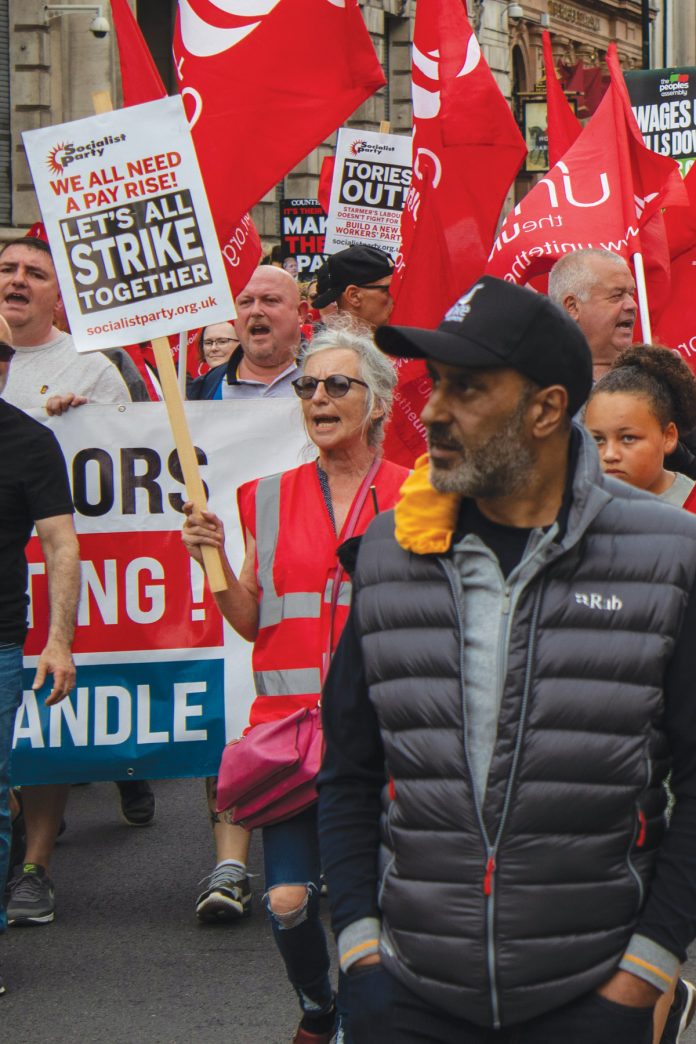‘Timetable of trouble: the wave of strikes set to hit the Tories this winter’. ‘Could Britain be facing a general strike this winter?’
Just two of the headlines in the Guardian last week that give a sense of the rising tide of anger and action by workers across the UK.
It seems not a day goes by without a new group of workers joining the list of strikes or ballots for strike action on pay.
And it isn’t just public sector workers like nurses, ambulance drivers, highway workers and university lecturers and staff who have announced planned strikes; or those who have already joined rail, Royal Mail and BT national strikes. Across the country, groups of workers, like those from the Amazon warehouse in Coventry and drivers at Best Food Logistics, are either balloting, preparing to strike or already striking!
Inflation-busting pay rise victories for bin workers, HGV and tanker drivers, and food workers in the last year and, most recently, Birmingham Metro workers, have demonstrated again and again that strikes win.
Tory chairman Nadhim Zahawi’s pathetic remark that “NHS strikes help Putin” not only stinks of desperation; it has done nothing but increase support for striking health workers from all workers, including previous Tory voters.
Of course, Zahawi seems to have forgotten the millions of pounds of Russian oligarchs’ money that has gone into Tory party coffers in recent years!
The Tories are running scared. But reports of Sunak’s new ‘winter of discontent’ unit, dedicated to coordinating the government’s response to the growing, fighting strike wave, should further strengthen the call for mass coordinated action and preparations for a 24-hour general strike.
Mobilisation and action of that character would play a huge role in raising workers’ sights and confidence, and inspire those desperate for a pay rise to join in the fight.
But at the same time, unions shouldn’t wait to link up with others. The rolling and coordinated action by the RMT and CWU has given a glimpse of the potential power of the working class in bringing society to a standstill. Rolling strikes by different unions, sectors and industries are crucial, and will be so in the build-up and in the follow up of an initial 24-hour general strike.
But workers also need a political programme and, ultimately, a political vehicle through which to fight for their interests.
Starmer’s Labour plays no such role, because he defends the interests of the capitalist elite rather than the working class. Asked recently in an interview in the Financial Times whether a Labour government would succumb to union pressure to give public sector workers inflation-matching pay rises of 10%, Labour’s deputy leader Angela Rayner didn’t hide her thoughts: “Brutally, no”, was her response .
Starmer’s Labour’s continuous refusal to support striking workers is no surprise. As the City of London’s tabloid mouthpiece, ‘City AM’, put it: “Starmer and Shadow Chancellor Rachel Reeves have also been on a so-called ‘salmon and scrambled eggs offensive’ in the City to sell their vision of the economy.”
The Tories can be brought down by this growing wave of strikes. But it’s clear that any victories and pay increases under a future Starmer-led Labour government will only come with a determined fight by workers.
Over in the US in the last week, Joe Biden – who when first inaugurated, boasted of being a ‘pro-labour’ president – has pushed legislation through the US Congress to force a new contract deal on US railway workers. This is an attempt to prevent a national rail strike, as growing numbers of rail workers rejected the proposed deal from the employers.
Such steps by Biden and the US capitalist class are a glimpse of the lengths the ruling class will go in order to prevent workers from striking. The TUC should meet any moves to further restrict the right to strike in Britain with a rapid call for a 24-hour general strike.
There is a crucial need to prepare the foundations for a political expression of the current strike wave at the next general election. As part of the Trade Unionist and Socialist Coalition, we are fighting for 100 workers’ candidates to stand. This has the potential to gain support from individuals, groups of workers, and official trade union branches, whether affiliated to Labour or not, as the vital need for this momentous strike wave to also make use of the ballot box becomes clear to growing numbers of workers.
The 2022 ‘Winter of Discontent’ – who’s striking?
In addition to strikes and victories around the country on the docks, oil refineries, buses, bins, in factories, and more, the national strike wave is stepping up:
- Last week saw the biggest university strikes ever by the University and College Union and, in many universities, Unison.
- The National Education Union (NEU) struck in 6th forms and there was a massive school shutdown by EIS union in Scotland.
- Royal Mail workers in CWU are stepping up their national strike action with more strikes on 9, 11, 14, 15, 23, 24 December, with a major national demo on 9 December. Post Office staff will strike on 12 and 13 December.
- RMT national rail members are escalating their fight with strikes on 13, 14, 16 and 17 December, with new dates announced from 6pm 24 – 7am 27 December, and more in January.
- For the first time in their history in England and Wales, RCN members are striking on 15 and 20 December – with ambulance workers striking on 21 and 28 December.
- PCS members in the civil service have voted to strike, NEU members in schools are balloting, firefighters in the FBU are balloting, and the BMA national strike ballot of junior doctors will start on 9 January.
The trade union movement can defeat the bosses and bring down the Tories!







